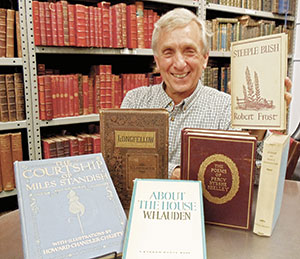
Collecting poetry books can be an especially rewarding and satisfying pursuit, according to expert Kenneth Gloss.
By Kenneth Gloss
It’s finally spring and the time of the year when young men and young women turn to love in the classic form of poetry.
But when you collect poetry books, you’re stepping into a world of words that has had a huge impact on literature. Poets were the forerunners for many of the trends that evolved in literature, because they were the first to dare to try new forms of expression. Poetry is like the hub of the wheel that influenced the spokes of literature springing from it. That alone makes it a fascinating area for collectors.
As with anything, you have to choose a specific area of poetry to collect before embarking on a book buy. There are millions of poetry books available, in every time period and choosing an author or an era is the best way to focus your collection. People who have an interest in the classics – Latin and Greek literature – may choose to collect copies of the works of Virgil or to find different editions of The Odyssey.
From there, you can move on to books printed from the 1400s to the 1600s. Poetry was popular then and there are literally hundreds of different editions of works from those periods. Then there are the great, classic poets, such as Shakespeare, Shelley, Keats, Wordsworth. These are the perennial favorites with collectors, some of whom collect for the love of the work, some who choose these authors for their style.
There are collectors who narrow their focus to one ethnic group or type of poetry. Some people collect just women poets, others who zero in on the poetry of the Harlem Renaissance. American poets, such as Longfellow, Holmes, Emerson and Emily Dickinson are also a popular choice with poetry collectors. Their works are plentiful and easy to find in bookstores around the country.
Some people collect the works of just one poet. Robert Frost has enough work out there that people can make a whole career out of collecting his material and looking for all of the books, cards, letters, signed manuscripts, etc. that he wrote. An early edition of Frost can cost thousands of dollars. First editions of his later books, which aren’t as rare, can be purchased for as little as $50. Of course, anything with his autograph is worth more than a book without his signature.
Whitman’s Leaves of Grass is another favorite with collectors. A first edition of that collection can cost tens of thousands of dollars. The book was first released in the 1850s and published up to the turn of century. What makes Whitman unique however, is what happened with each edition. Before a new version was released, Whitman would add or subtract lines, constantly revising the poetry. Each edition of Leaves of Grass is unlike the others in some way. It makes collecting Whitman a lot more fun.
The popular authors: Longfellow, Frost, Allen Ginsburg, ee cummings, Yeats, are among the ones that people ask for the most. I get constant requests for certain editions of theirs. Many people think poetry doesn’t sell that fast, or isn’t as popular as it once was. I disagree. If someone calls me and says they have a collection of 300 books of poetry, the collectors hear about it and it’s sold quickly.
One thing new collectors need to be wary of is claims of rarity of works by ‘unknown’ authors. Some works are rare because they were published by vanity presses and the author, who paid for the printing, only ran a few hundred copies. Yes, there are few of these editions available, but it doesn’t make them worth anything. A self-published book, regardless of how many copies exist, is rarely worth much.
The best part about collecting poetry is the range in prices and the variety of material. You can find reproductions, reprints and gorgeous old editions of works that cost little or nothing. Many of these were gift books published in the mid-1800s that collectors can buy for $10-30.
As technology advances, so do the trends in collecting. Many people now are collecting audio books of poetry because hearing the words read makes for a stronger experience. The popularity of poetry reading nights has increased the availability of audio poetry.
Poetry is one of those forms of literature that has been popular throughout the ages. No matter what time period you are interested in there is a type of poetry that goes along with it. Poets, who were often the first to take chances with words, have greatly affected the way people think and write. The literature of each era reflects the changes and breakthroughs in the poetry. Poetry will continue to be popular with collectors for decades to come because it’s a unique language that speaks to millions and lasts forever.
Kenneth Gloss is the owner of the Brattle Book Shop in Boston, one of America’s oldest and largest antiquarian bookstores. The Brattle Book Shop is celebrating its 65th year of Gloss family ownership. Visit their Website at: www.brattlebookshop.com for a list of his free and open talks, to get books appraised or call 1-800-447-9595. Ken is often a guest appraiser on PBS’ Antiques Roadshow.















Reader Comments